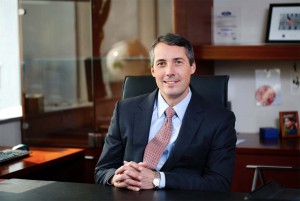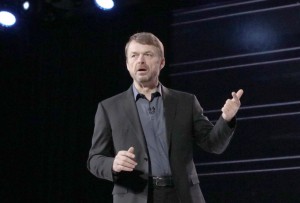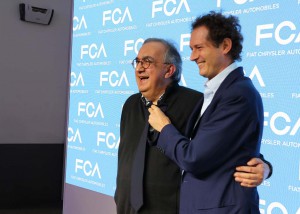Ford Motor Co. ended 2020 posting a loss for the final quarter of the year as well as for the full year as the pandemic wreaked havoc on the company’s already difficult financial position.
The automaker reported a net loss of $2.8 billion, or 70 cents per share, on revenue of $36 billion during the fourth quarter, pulling the full year’s results down to a net loss $1.3 billion, or 32 cents per share, on revenue of $127.1 billion.
In the midst of a corporate-wide restructuring process to improve its profitability, the company was also hit hard — like most automakers — by the COVID-19 pandemic. While the numbers weren’t great, it’s a means to an end.
“We are profoundly changing the trajectory of our earnings power,” said John Lawler Ford’s chief financial officer, “unlocking the tremendous value Ford can create for customers, shareholders and other stakeholders.”
Sticking to the plan

Ford CFO John Lawler said the automaker could lose 10% to 20% of its Q1 production due chip shortages.
That earnings power is focused on securing an 8% adjusted EBIT margin, specifically 10% in the U.S. and 6% in Europe with the rest of the company’s regional operations turning a profit too. Lawler said the company’s third and fourth quarter results “provided evidence of progress” in the company’s effort to improve profitability.
Despite the losses, Ford did improve its overall liquidity, finishing 2020 with $31 billion in cash and a total liquidity of almost $47 billion.
On an adjusted basis, the company’s EBIT of $1.7 billion, up from $485 million during the year-ago period. The automotive EBIT margin was 3.8%. The company noted that the gains were “broad-based and largely resulted from improved pricing and lower structural costs, as well as the overlap with UAW contract-ratification costs in 2019.”
Company officials acknowledged the year wasn’t what they hoped and were optimistic about 2021. Ford’s Lawler said the company was on course to earn $8 billion to $9 billion in adjusted EBIT – including a $900 million non-cash gain on its investment in Rivian – and generate $3.5 billion to $4.5 billion in adjusted free cash flow in 2021.
Semiconductor shortage may hit bottom line
This optimism comes despite an ongoing issue with semiconductor availability. Lawler said the company was diligently monitoring the situation, but it is “so liquid” that it’s tough to determine what the impact on the bottom line will be.
He did estimate the company could lose as much as 20% of its first quarter production as plants are forced to shut down temporarily, and that those losses could continue throughout the first half of the year. It’s possible to make up some of that in the second half, he noted, but it was too early to tell.
The shortages could lower Ford’s 2021 adjusted EBIT by $1 billion to $2.5 billion, he said. He added the company expects full-year cash and EBIT effects to be about equal – with quarterly cash implications more volatile, given the mechanics of company working capital.





